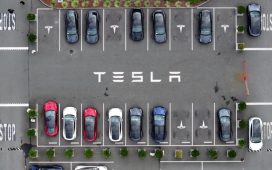Contemporary Amperex Technology Co. Ltd. unveiled a sodium-ion battery Thursday, a type of lower-density cell that uses cheaper raw materials than batteries made from lithium-ion metals.
As well as a first generation of sodium batteries, the Chinese auto supplier also launched a battery-pack solution that can integrate sodium-ion cells and lithium-ion cells into one case, compensating for the energy-density shortage of the former while preserving its advantages.
“Sodium-ion batteries have unique advantages in low-temperature performance, fast charging and environmental adaptability,” CATL Chairman Zeng Yuqun said. “Moreover, they’re compatible and complementary with lithium-ion batteries. Diversified technical routes are an important guarantee for the long-term development of the industry.”
While CATL is the world’s biggest battery maker — supplying Telsa Inc. and selling 34.1 gigawatt hours in the first half, up 234 percent year-on-year for a market share of 30 percent — like other manufacturers it has been hit by rising raw materials costs. The price of lithium carbonate, a core ingredient in most EV batteries, has doubled this year while the price of nickel, another key metal, is at a five-month high.
Research group Fitch Solutions said in a May report that lithium prices will keep trending higher in 2021 and 2022 as demand for lithium-ion batteries accelerates amid the worldwide shift toward cars that are better for the environment. Tight upstream supply is also expected to keep prices elevated.
Outside of their lower raw materials costs — there are abundant sodium resources in the Earth’s crust — sodium-ion batteries have a few advantages. A long charging time won’t cause battery damage and their chemical reaction is free of corrosivity. But their lower energy density tends to exclude them from powering passenger vehicles that require decent range, so they’re mainly used for low-speed EVs and low-end energy storage solutions.
Notwithstanding, CATL said that through breakthroughs in R&D, its first-generation sodium-ion batteries have reached 160 watt-hours/kilogram, a measure of energy density of energy, and should exceed 200 Wh/kg in coming generations.
A “sodium-ion battery solution could potentially solve cost challenges faced by Chinese renewables developers, bringing energy storage cost down to a new level,” Wood Mackenzie senior analyst Le Xu said in a note following the announcement. “It could help China to achieve a carbon neutral target in the future.”
Zeng, who also founded CATL, said in May that mass production and industrialization of such cells is still at an early stage. The company called for greater industry deployment around sodium-ion batteries.







